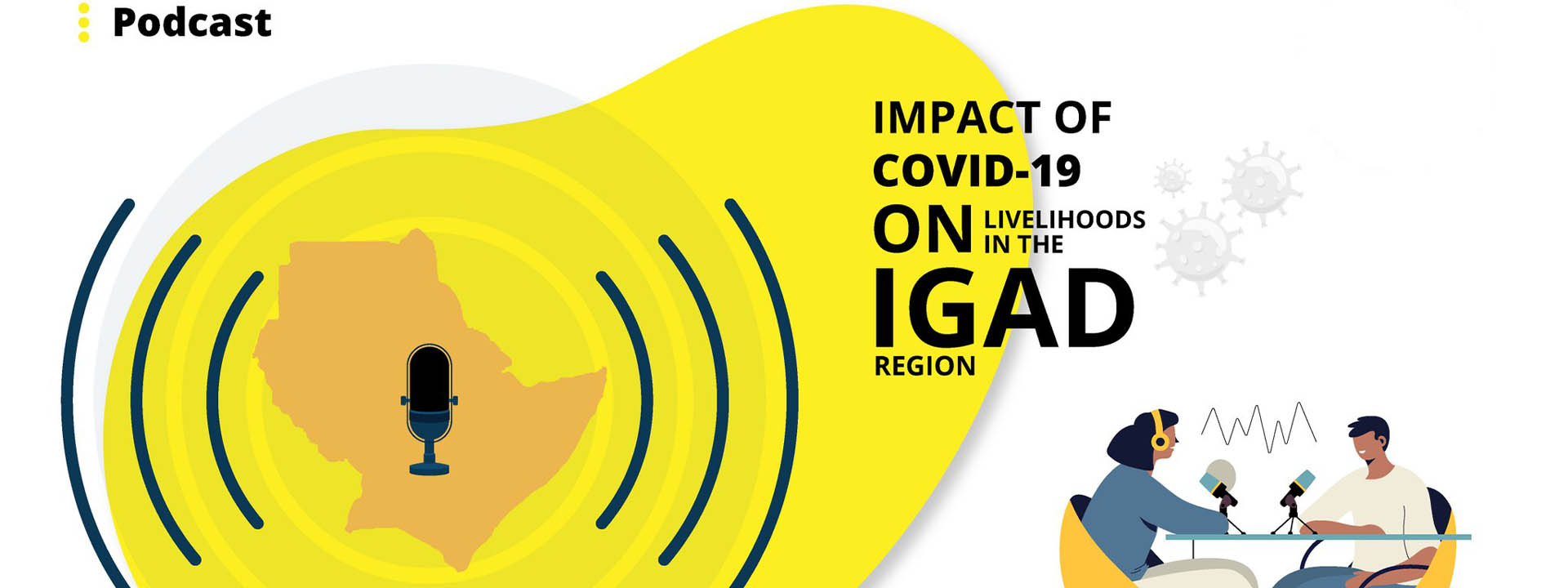The compounding impacts of COVID-19 pandemic, climatic shocks, conflict and insecurity, floods and desert locust invasion resulted in a crisis of an unprecedented magnitude in the IGAD Region. This severely affected the livelihoods of both rural and urban dwellers – but especially the poor employed in the informal sector have been eroded. It also significantly disrupted the socio cultural phenomena in the community at large.
Measures by the Governments of IGAD Member States to curb the spread of the virus including movement restrictions, border closures and social distancing that were deemed necessary, had severe implications on the implementation of IGAD’s approved Operational Plan as well as the main method of service delivery of Programmes and Projects activities. Convening regional Policy dialogues and stakeholder consultations usually required for establishing consensus for the implementation of regional livelihoods Programmes and commitments became very difficult in the face of these restrictive measures. It severely hampered coordination and collaboration between the various member countries’ government offices, Experts from the IGAD Secretariat and its Specialised Institutions, and partner institutions as they all had to work from home for a long period of time as never experienced previously. Adapting to a new work environment that mainly consisted in operating remotely and holding meetings virtually affected the level of traditional interactions stakeholders were used to, and resulted in a reduced implementation pace.
At the strategic level, IGAD responded by developing Emergency Response Strategies as one way to mitigate the negative impact of Covid-19 on food security and nutrition, health, peace and security and the Economy. Through this initiative, for example, IGAD was able to rally support from Member States and development partners towards specific measures to reduce the negative impact of covid-19.
At the operational level, IGAD undertook two (2) critical measures to adapt to the new situation:
- it revised its operational plan by rescheduling the timelines of the planned activities and reviewed the budgets in consultation with the donors, and
- upgraded the ICT infrastructure to enable regional dialogue meetings and consultations to be held virtually.
While the implementation of several activities had to be suspended due to the lockdown, the upgraded ICT infrastructure enabled crucial policy meetings to be held for decision making purposes. For example, IGAD was able to convene the first ever virtual Assembly of IGAD Heads of State and Governments in July 2020, which was followed by several IGAD Ministerial Committee meetings including on Health to deliberate on the covid-19 situation. IGAD was also able to convene a meeting of its development partners to mobilise support and coordinate actions. It also conducted various experts meeting and validated strategies, guidelines during online gatherings.
While COVID-19 has forced Organisations, including IGAD, to rethink almost every aspect of their business processes, it has also validated the importance of the strategic function of an Organisation. Even in pre–COVID-19 times, Organisations operated in increasingly uncertain, complex, and dynamic environments. This was no exception to IGAD as it had to navigate through risks and uncertainties in order to effectively and efficiently discharge its regional mandate.
Tasked with reshaping the long-term strategic direction and building the adaptive capacity of the Organisation, IGAD has embarked on the implementation of a comprehensive digitalisation agenda that will see the organisation automate its entire service delivery business processes for more operational effectiveness and efficiency – paperless IGAD.
The pandemic has also underscored the importance and emphasis on being able to navigate change and uncertainty. In this regard, IGAD has developed and is currently implementing a comprehensive Risk Management Policy Framework. Fundamental and structural changes like digital transformation that IGAD is now pursuing, that seemed far off and extremely ambitious in the past, now appear likely to occur faster and sooner than they would otherwise. IGAD is revamping and integrating its management systems rapidly and embracing new ways of working and learning.
As a fundamental lesson, the rapidly evolving environment calls for a strategic approach that focuses on continuously scanning the environment to see what is coming around the corner and positioning the Organisation for sustained success. This would enable IGAD to operate effectively and efficiently in a post-COVID-19 environment, which is widely referred to—yet still not clearly defined—as the “new normal.”
Listen to full podcast below

By Awira Anthony
Director
Planning Coordination and Partnerships Division
May 5, 2022

